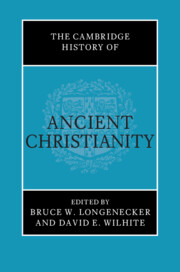Book contents
- The Cambridge History of Ancient Christianity
- The Cambridge History of Ancient Christianity
- Copyright page
- Contents
- Figures
- List of Contributors
- Editors’ Preface
- Part I Contested Contexts
- Part II Contested Figures
- Part III Contested Heritage
- 9 Jews and Christians in Pagan Antiquity
- 10 The Marcionite Option
- 11 The Gnostic Options
- 12 Early Christian Involvement in Classical Education, Literature, and Philosophy
- 13 Scriptures and Interpretations in Early Christian History
- Part IV Contested Cultures
- Part V Contested Beliefs
- Part VI Contested Bodies
- Ancient Sources
- Modern Authors
- References
9 - Jews and Christians in Pagan Antiquity
From the First through the Third Centuries
from Part III - Contested Heritage
Published online by Cambridge University Press: 23 August 2023
- The Cambridge History of Ancient Christianity
- The Cambridge History of Ancient Christianity
- Copyright page
- Contents
- Figures
- List of Contributors
- Editors’ Preface
- Part I Contested Contexts
- Part II Contested Figures
- Part III Contested Heritage
- 9 Jews and Christians in Pagan Antiquity
- 10 The Marcionite Option
- 11 The Gnostic Options
- 12 Early Christian Involvement in Classical Education, Literature, and Philosophy
- 13 Scriptures and Interpretations in Early Christian History
- Part IV Contested Cultures
- Part V Contested Beliefs
- Part VI Contested Bodies
- Ancient Sources
- Modern Authors
- References
Summary
“Judaism,” “Christianity,” and “paganism” are terms that historians use to distinguish between antiquity’s different “religions.” These words – all four – have an abstract quality: They suggest unified systems of belief and of doctrine, and clear and stable identities whether for individuals or for groups. Perhaps such formulations fit the modern period. In Roman antiquity, however, different groups of people made various arrangements, both with each other and with the many nonhuman powers that filled the space between the spheres of the heavens and the earth around which they turned. “Paganism” – the larger culture housing all of the empire’s different communities of Jews and of Christians – actually refers to an overwhelmingly diverse assortment of loca sancta, practices, traditions, and convictions.1 Many of the ancient city’s social activities that we would classify as “government” or as “athletics” or as “entertainment” were in fact “religious,” shaped by ritual displays of respect for and loyalty to those gods guarding the city’s well-being. And, whether as observers or as participants, those people whom we house within our other two abstract categories, “Judaism” and “Christianity,” often and freely – even enthusiastically – joined in.
- Type
- Chapter
- Information
- The Cambridge History of Ancient Christianity , pp. 199 - 227Publisher: Cambridge University PressPrint publication year: 2023
References
Select Bibliography
- 1
- Cited by

